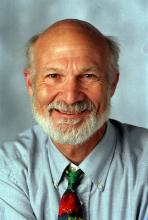Born 24 July 1940 Hauerwas was educated at Yale Divinity School (BD 1965) and Yale University Graduate School (MA MPhil PhD 1968). He has since taught at Notre Dame and is presently Gilbert T. Rowe Professor of Theological Ethics at Duke Divinity School.
Hauerwas was schooled in a tradition of Christian ethics deriving from the Niebuhrs (he studied under James Gustafson at Yale Divinity School) but regards his own work as a rejection of that tradition. He would point to the Mennonite theologian John Howard Yoder as a significant influence and also to Karl Barth. Aspects of the Yale School of Lindbeck and Frei can arguably be seen in his work, however, particularly the notion of doctrine as something to be lived out rather than merely studied (cf. Linbeck The Nature of Doctrine) and the emphasis on narrative.
In Hauerwas’ hands, an emphasis on narrative becomes a way of recovering ‘virtue ethics’ (an idea he found in Alasdair McIntyre’s work): Christian ethics should not be concerned with arguments concerning the right way through dilemmas; instead it is an analysis of how community life in the church shapes character so that lives become instinctively and unthinkingly virtuous. Hauerwas’ distinctive account of this comes from his discovery of Yoder, who taught him a believers’ church tradition, which has an extraordinarily strong account of the significance of the community of the local church and a witness to nonviolence as the heart of Christian ethics.
Hauerwas’ preferred genre of writing is the essay or isolated lecture, and most of his two dozen or so books are loosely themed collections of essays. Typically, a Hauerwas essay will juxtapose a situation calling for moral reflection and a liturgical or doctrinal resource which will then be used to show how indwelling the gospel story breaks open the ethical dilemma in unexpected ways. These essays are always characterised by verve and humour. In addition to pacifism, he has had an abiding interest in questions concerning the care and life of people with learning disabilities and in medical ethics. His most recent work has offered theological criticisms of the nature of the university, with a book on this theme promised.
Hauerwas’ critics have repeatedly asked for an adequately theorised account of the methodology that underlies these forays. Hauerwas eschews ethical theory, claiming that virtues and character exist only in the concrete and not in the abstract. The closest account of his methodology is an early book The Peaceable Kingdom; he acknowledges his Gifford Lectures to be the closest he will ever offer to the ‘big book . . . that pull[s] it all together’ (With the Grain of the Universe, p. 10); that they proceed largely by narrating the lives of three former Gifford lecturers might be frustrating but it is unsurprising.
In 2001 Time magazine named Hauerwas ‘America’s best theologian’. His response? ‘“Best” is not a theological category.’



